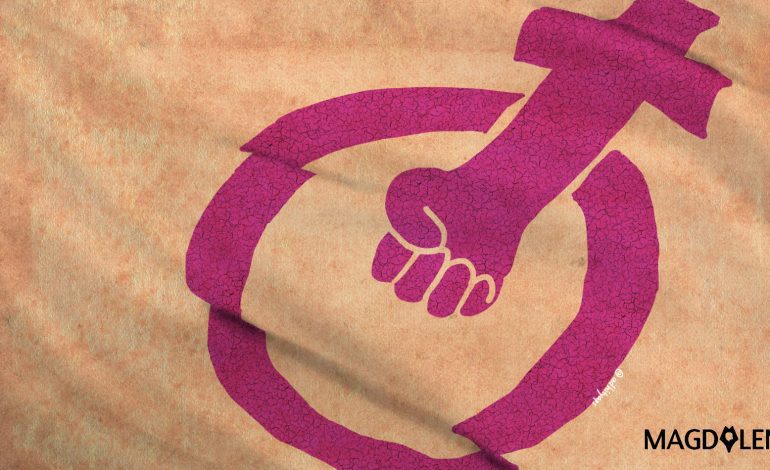The F-word: The Rise and Fall of Feminist Movements in Indonesia

When activist and scholar Gadis Arivia and her team at feminist publication Jurnal Perempuan were preparing a two-day international conference on feminism last month, they were repeatedly reminded by several parties not to use the “f-word”.
In the largely conservative and patriarchal Indonesia, feminism is unpopular concept, a Western idea incompatible with the fabric of society. And with the growing rise of religious conservatism in the country – with its toxic consequences – feminism has increasingly received a bad rep. Religious fundamentalist groups have made the campaign against “liberalism and feminism” central to their cause.
“We have to admit that we’ve failed to push the word feminism in the past 20 years. Gender has been used . . . but gender and feminism are different,” said Gadis during the conference, which coincided with the 20th anniversary of the feminism journal she co-founded.
“But we have to stick with what we believe in.”
She said she refused to accept the notion that feminism comes from the West as Indonesian women have fought for gender equality and justice since the early 20th century.
“In 1928, our mothers held Women Congress, saying that women must be independent, that polygamy must be rejected, and so on,” Gadis said.
Historians have pointed to the pre-1965 era as a more advanced period for women’s movements, which were seen as being solid and received international recognition for being very progressive.
Back then women teachers proactively eradicated illiteracy. They walked to remote villages during school break to teach women villagers to read and write, said Saskia Wierienga, a Dutch sociologist from the University of Amsterdam who has done extensive researches on gender issues in Indonesia. The two women’s organizations that were prominent were Perwari and Gerwani – the latter being affiliated to the Indonesian Communist Party (PKI).
“Gerwani consisted of militant mothers who were revolutionary, who fought for emancipation, gender relations, social justice and gender justice, and (who campaigned against) violence against women,” said Saskia, who is also the chairperson of the Foundation of the International People’s Tribunal on the 1965 crimes against humanity in Indonesia (IPT 1965).
Following the aborted coup blamed on the PKI in 1965, state-sponsored purges of communists in Indonesia occurred in the next year, wiping an estimated of half a million people, many of whom had no connection to communism, and kept hundreds of thousands of others incarcerated for years. Subsequently, Gerwani was mythologized as sex-crazed women who danced naked after mutilating the genitals of the army generals, a depiction immortalized in a state-commissioned film.
“After the ‘65 tragedy (women’s movement groups) were gone. Not just Gerwani, but the entire progressive movements. What came next were the likes of Bhayangkari, the policemen’s wives’ association, that no longer fight for women’s rights,” Wierienga said.
“During the New Order regime, women are placed in the domestic realm, saying that the ‘kodrat’ (destiny) of women are dapur-sumur-kasur (kitchen-well-bed). No more militant moms. What emerged was the concept of prosperous family.”
As the regime fell following the resignation of strongman Soeharto in 1998, democracy reigned but at the same time it opened the door for the wave of religious conservatism.
“Sharia-based bylaws have been increasing. The discourse is now regressive, steered towards gender harmony, harmonious family. This is manipulative, because nobody can disagree with such discourse. Women must be gentle, obedient, clean, pious, and they must help their husband to earn money. It’s basically going back to the New Order regime,” Wierienga asserted.
Gadis concurred, saying the Indonesian society has been going backward with religious conservatism in the public sphere, encroaching on private lives, while women remaining unaware of their rights to choose.
“Even in animated movies women’s bodies are being censored on television. Imagination is feared. Young people won’t be able to understand the meaning of respecting one’s bodies. It will lead to violence,” she said.
The academic field is no less backward, she added. Unlike in the West, where campuses are a place for progressive ideas to emerge and be nurtured, universities in Indonesia are more backward and repressive, Gadis said.
“Universities do not help, for example, in the case of LGBT, which is part of the feminist movement,” she said.
Strategies
Islamic jurisprudence professor Musdah Mulia said women’s movement is currently in competition with religious extremism and radicalization that negates the existence of women.
“The government is negligence, and the Constitutional Court and the Supreme Court have become religious courts with traditional interpretation,” she said. “Our duty as educated people is to develop a new understanding on Islam. We must be willing to create enlightening interpretation. For example, if you read Quran thoroughly, it actually wants to abolish polygamy eventually, just like it abolished slavery.”
Gadis added that Islamic feminism is where everyone is open to speak about verses in Quran.
“LGBT people have the right to speak about Islam; atheists have the right to discuss Islam. Islam does not belong to Muslim only,” she said.
One of the biggest challenges is that feminists and feminisms are deemed heretical and a means to convert people to Christianity, said Misiyah, executive director of Kapal Perempuan (Women’s Ship Institute) that focuses on empowering women, particularly local female leaders in eastern Indonesia.
Kapal Perempuan, which also offers courses on feminism, has received harsh treatment and death threats from religious radicals. However, the organization learned that fundamentalism does not stand on its own, said Misiyah.
“We went head to head with radical groups, presenting our religious interpretation, verse by verse, but to no avail,” she said. “In Lombok Utara (West Nusa Tenggara), however, we managed to negotiate because the wives are empowered economically. So we learned that we have to strategize using other aspects.”
Former first lady Sinta Nuriyah, a feminist/women’s activist in her own right, said she had to be careful with the language and the use of the word feminism when dealing with religious community.
“The center of subordination of women is pesantren (Islamic boarding school),” she said.
“Women enjoy the subordination because they see it as the gateway to heaven. Many people are allergic to the word feminism so I use the concept that women are equal partner of men, because there is a verse that says that women are garment for men and vice versa,” said Sinta, who attempted the reinterpretation of Kitab Kuning, the classic (mid-century) Islamic jurisprudence text written in Arabic, to become more women friendly.
“They don’t like the name ‘Women Crisis Center’ so we change it to Puspita, Pusat Perlindungan bagi Wanita (Center of Women Protection),” added Sinta, who also initiated the program PUAN – Pesantren for Women Empowerment.
Despite the challenges, Gadis of Jurnal Perempuan contended feminism is not dead but well alive, with the emergence of young feminists and activists and the coverage that goes beyond women’s empowerment issues.
“Women’s movement in the country is not fragmented – that’s a myth. Here in the conference, we have 400 participants with diverse background, coming from nearly all provinces and 10 countries. We are united, with the collective goals to uphold justice for all,” she said.
Read Hera’s article about Islam and with feminism and follow @heradiani on Twitter.






















